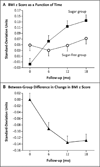Resolved: there is sufficient scientific evidence that decreasing sugar-sweetened beverage consumption will reduce the prevalence of obesity and obesity-related diseases
- PMID: 23763695
- PMCID: PMC5325726
- DOI: 10.1111/obr.12040
Resolved: there is sufficient scientific evidence that decreasing sugar-sweetened beverage consumption will reduce the prevalence of obesity and obesity-related diseases
Abstract
Sugar-sweetened beverages (SSBs) are the single largest source of added sugar and the top source of energy intake in the U.S. diet. In this review, we evaluate whether there is sufficient scientific evidence that decreasing SSB consumption will reduce the prevalence of obesity and its related diseases. Because prospective cohort studies address dietary determinants of long-term weight gain and chronic diseases, whereas randomized clinical trials (RCTs) typically evaluate short-term effects of specific interventions on weight change, both types of evidence are critical in evaluating causality. Findings from well-powered prospective cohorts have consistently shown a significant association, established temporality and demonstrated a direct dose-response relationship between SSB consumption and long-term weight gain and risk of type 2 diabetes (T2D). A recently published meta-analysis of RCTs commissioned by the World Health Organization found that decreased intake of added sugars significantly reduced body weight (0.80 kg, 95% confidence interval [CI] 0.39-1.21; P < 0.001), whereas increased sugar intake led to a comparable weight increase (0.75 kg, 0.30-1.19; P = 0.001). A parallel meta-analysis of cohort studies also found that higher intake of SSBs among children was associated with 55% (95% CI 32-82%) higher risk of being overweight or obese compared with those with lower intake. Another meta-analysis of eight prospective cohort studies found that one to two servings per day of SSB intake was associated with a 26% (95% CI 12-41%) greater risk of developing T2D compared with occasional intake (less than one serving per month). Recently, two large RCTs with a high degree of compliance provided convincing data that reducing consumption of SSBs significantly decreases weight gain and adiposity in children and adolescents. Taken together, the evidence that decreasing SSBs will decrease the risk of obesity and related diseases such as T2D is compelling. Several additional issues warrant further discussion. First, prevention of long-term weight gain through dietary changes such as limiting consumption of SSBs is more important than short-term weight loss in reducing the prevalence of obesity in the population. This is due to the fact that once an individual becomes obese, it is difficult to lose weight and keep it off. Second, we should consider the totality of evidence rather than selective pieces of evidence (e.g. from short-term RCTs only). Finally, while recognizing that the evidence of harm on health against SSBs is strong, we should avoid the trap of waiting for absolute proof before allowing public health action to be taken.
Keywords: Diabetes; nutrition; obesity; sugar-sweetened beverages.
© 2013 The Author. obesity reviews © 2013 International Association for the Study of Obesity.
Conflict of interest statement
Potential conflicts of interest: None
Figures




Comment in
-
Will reducing sugar-sweetened beverage consumption reduce obesity? Evidence supporting conjecture is strong, but evidence when testing effect is weak.Obes Rev. 2013 Aug;14(8):620-33. doi: 10.1111/obr.12048. Epub 2013 Jun 7. Obes Rev. 2013. PMID: 23742715 Free PMC article.
Similar articles
-
Beverage Consumption and Growth, Size, Body Composition, and Risk of Overweight and Obesity: A Systematic Review [Internet].Alexandria (VA): USDA Nutrition Evidence Systematic Review; 2020 Jul. Alexandria (VA): USDA Nutrition Evidence Systematic Review; 2020 Jul. PMID: 35349233 Free Books & Documents. Review.
-
Environmental interventions to reduce the consumption of sugar-sweetened beverages and their effects on health.Cochrane Database Syst Rev. 2019 Jun 12;6(6):CD012292. doi: 10.1002/14651858.CD012292.pub2. Cochrane Database Syst Rev. 2019. PMID: 31194900 Free PMC article.
-
Intake of sugar-sweetened beverages and weight gain: a systematic review.Am J Clin Nutr. 2006 Aug;84(2):274-88. doi: 10.1093/ajcn/84.1.274. Am J Clin Nutr. 2006. PMID: 16895873 Free PMC article. Review.
-
Dietary sugar and body weight: have we reached a crisis in the epidemic of obesity and diabetes?: health be damned! Pour on the sugar.Diabetes Care. 2014 Apr;37(4):950-6. doi: 10.2337/dc13-2085. Diabetes Care. 2014. PMID: 24652725 Free PMC article. Review.
-
Changes in water and beverage intake and long-term weight changes: results from three prospective cohort studies.Int J Obes (Lond). 2013 Oct;37(10):1378-85. doi: 10.1038/ijo.2012.225. Epub 2013 Jan 15. Int J Obes (Lond). 2013. PMID: 23318721 Free PMC article.
Cited by
-
A Brief Motivational Intervention Differentially Reduces Sugar-sweetened Beverage (SSB) Consumption.Ann Behav Med. 2021 Oct 27;55(11):1116-1129. doi: 10.1093/abm/kaaa123. Ann Behav Med. 2021. PMID: 33778854 Free PMC article. Clinical Trial.
-
Does the Australian Health Star Rating System Encourage Added Sugar Reformulation? Trends in Sweetener Use in Australia.Nutrients. 2021 Mar 10;13(3):898. doi: 10.3390/nu13030898. Nutrients. 2021. PMID: 33802024 Free PMC article.
-
The ethics of excise taxes on sugar-sweetened beverages.Physiol Behav. 2020 Oct 15;225:113105. doi: 10.1016/j.physbeh.2020.113105. Epub 2020 Jul 24. Physiol Behav. 2020. PMID: 32712210 Free PMC article.
-
A Water and Education Provision Intervention Modifies the Diet in Overweight Mexican Women in a Randomized Controlled Trial.J Nutr. 2015 Aug;145(8):1892-9. doi: 10.3945/jn.115.212852. Epub 2015 Jul 1. J Nutr. 2015. PMID: 26136584 Free PMC article. Clinical Trial.
-
A Systematic Review to Assess Sugar-Sweetened Beverage Interventions for Children and Adolescents across the Socioecological Model.J Acad Nutr Diet. 2016 Aug;116(8):1295-1307.e6. doi: 10.1016/j.jand.2016.04.015. Epub 2016 Jun 2. J Acad Nutr Diet. 2016. PMID: 27262383 Free PMC article. Review.
References
-
- Malik VS, Willett WC, Hu FB. Global obesity: trends, risk factors and policy implications. Nature reviews Endocrinology. 2012 - PubMed
-
- Flegal KM, Carroll MD, Kit BK, Ogden CL. Prevalence of obesity and trends in the distribution of body mass index among US adults, 1999–2010. JAMA : the journal of the American Medical Association. 2012;307:491–497. - PubMed
-
- Finkelstein EA, Trogdon JG, Cohen JW, Dietz W. Annual medical spending attributable to obesity: payer-and service-specific estimates. Health Aff (Millwood) 2009;28:w822–w831. - PubMed
-
- CDC. National diabetes fact sheet: national estimates and general information on diabetes and prediabetes in the United States. [WWW document] URL http://www.cdc.gov/diabetes/pubs/estimates11.htm.
Publication types
MeSH terms
Substances
Grants and funding
LinkOut - more resources
Full Text Sources
Other Literature Sources
Medical

